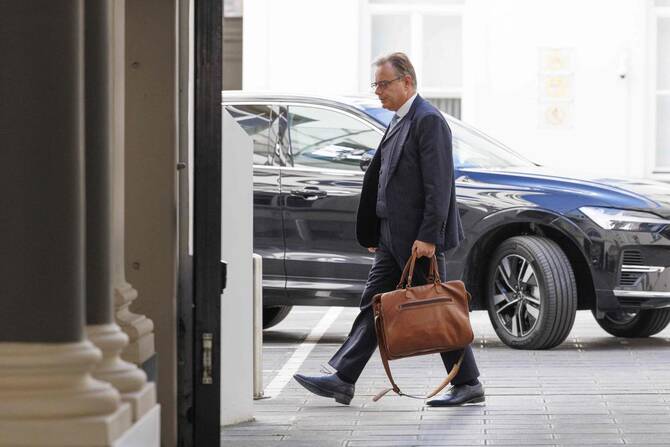
Israeli Prime Minister Benjamin Netanyahu sharply criticized Belgium after its decision to recognize Palestine as a state. The recognition of Palestine, announced by Belgian leaders at the UN General Assembly this month, drew fierce condemnation from Israel, with Netanyahu branding Belgian Prime Minister Bart De Wever a “weak leader.”
Netanyahu’s Harsh Remarks
In a statement issued through his office and shared on the official X account, Netanyahu accused De Wever of appeasing “Islamic terrorism by sacrificing Israel.” He went further, claiming, “He wants to feed the terrorist crocodile before it devours Belgium.”
The Israeli leader’s comments reflect his growing frustration with Western governments that have shifted toward formal recognition of Palestinian statehood in recent months.
Belgium’s Recognition of Palestine
Belgium became the latest Western country to announce it would support Palestinian statehood during the upcoming UN General Assembly. The decision followed similar declarations from Australia, Canada, and France.
Belgian Foreign Minister Maxime Prevot explained the move in a statement on X. He said it came in response to “the humanitarian tragedy” unfolding in Gaza. He added that Belgium would also impose “firm sanctions” on the Israeli government.
The announcement marked a significant break from previous Belgian positions, with the government adopting a more assertive role in the debate over the Middle East conflict.
Read: China Declares Itself ‘Unstoppable’ at Beijing Parade
Israeli Far-Right Pushes Annexation
Israel’s far-right leadership reacted strongly to the Belgian move. Finance Minister Bezalel Smotrich called for the annexation of large parts of the occupied West Bank in response to international recognition of a Palestinian state.
Smotrich, a key figure in Netanyahu’s coalition, argued that external pressure on Israel should trigger stronger measures to consolidate Israeli control over contested territories rather than concessions.
His remarks underscore the deepening divide between Israel and many of its Western allies as diplomatic momentum builds around Palestinian recognition.
Gaza Operations Intensify
While Israel faces increasing international pressure to scale back its military campaign, its operations in Gaza continue to intensify. Israeli forces are now laying the groundwork for seizing Gaza City, according to military analysts and reports from humanitarian agencies.
The United Nations recently declared famine in the city, warning that civilians remain at extreme risk due to ongoing bombardments and restrictions on aid delivery.
Despite growing calls for restraint, Israeli officials maintain that their operations are essential to dismantling Hamas’s infrastructure.
Roots of the Conflict
The current war traces back to October 7, 2023, when Hamas launched a deadly attack on Israel. According to Israeli figures, the assault killed 1,219 people, most of them civilians.
Israel responded with a large-scale military campaign in Gaza. Since then, airstrikes and ground operations have devastated the enclave.
The Gaza health ministry, under Hamas administration, reports that at least 63,746 Palestinians have been killed, the majority of them civilians. These figures have been cited by the United Nations as reliable.
International Pressure Mounts
Belgium’s recognition of Palestine adds to mounting diplomatic pressure on Israel. Western governments, long hesitant to recognize Palestinian statehood, are increasingly shifting amid the humanitarian crisis in Gaza.
For many, Belgium’s decision reflects frustration with Israel’s continued military escalation and settlement expansion in the West Bank. By recognizing Palestine, these governments aim to signal disapproval while pushing for a new approach to the long-standing conflict.
However, Israeli leaders see these moves as undermining their security and rewarding what they describe as terrorism. Netanyahu and his allies insist that recognition of Palestinian statehood only emboldens militant groups like Hamas.
Palestinian Response
Palestinian leaders welcomed Belgium’s announcement. They described the decision as a moral and political victory that underscores international sympathy for the Palestinian cause.
Officials in Ramallah called on other countries to follow Belgium’s lead and increase pressure on Israel to halt its military campaign.
They also framed recognition as a step toward restarting negotiations for a two-state solution, which has been stalled for years.
Growing Divide Between Allies
The exchange between Netanyahu and De Wever highlights the widening rift between Israel and some of its Western allies. Once staunch supporters of Israel, several European and North American governments are now publicly questioning Israel’s long-term strategy.
By using strong language against Belgium, Netanyahu signaled that Israel will not tolerate what it sees as betrayal. Yet his response may further isolate Israel at a time when it faces increasing scrutiny over its conduct in Gaza.
What Lies Ahead
As Belgium prepares to formalize its recognition at the UN General Assembly, the diplomatic clash with Israel is set to deepen. More Western states may follow, making recognition of Palestine a growing trend that challenges Israel’s international standing.
For now, Netanyahu’s government remains defiant, pressing ahead with military operations and settlement policies while dismissing foreign criticism as misguided and dangerous.
Follow us on Instagram, YouTube, Facebook,, X and TikTok for latest updates
